英语选修六二单元知识点总结
- 格式:docx
- 大小:20.52 KB
- 文档页数:6
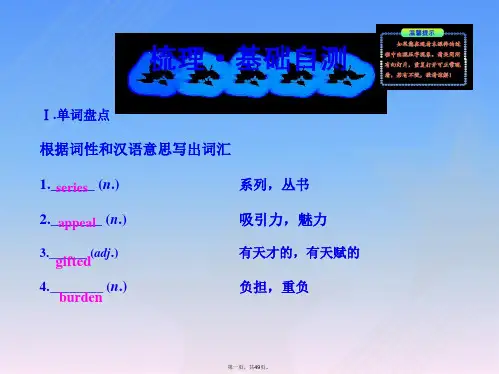
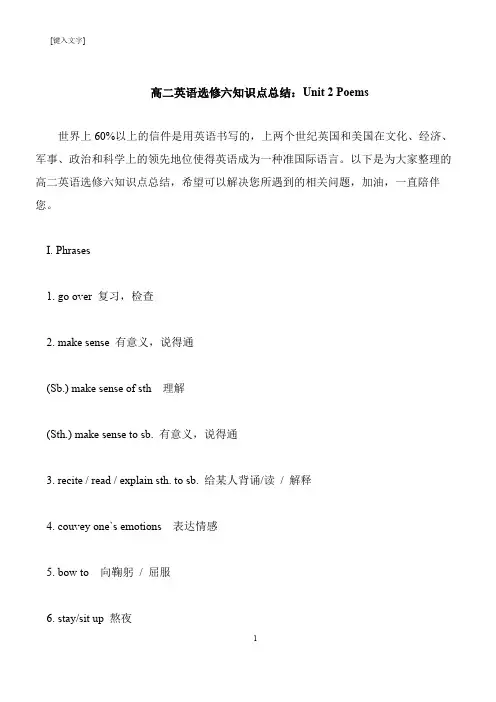
[键入文字]
高二英语选修六知识点总结:Unit 2 Poems
世界上60%以上的信件是用英语书写的,上两个世纪英国和美国在文化、经济、军事、政治和科学上的领先地位使得英语成为一种准国际语言。
以下是为大家整理的高二英语选修六知识点总结,希望可以解决您所遇到的相关问题,加油,一直陪伴您。
I. Phrases
1. go over 复习,检查
2. make sense 有意义,说得通
(Sb.) make sense of sth 理解
(Sth.) make sense to sb. 有意义,说得通
3. recite / read / explain sth. to sb. 给某人背诵/读/ 解释
4. couvey one`s emotions 表达情感
5. bow to 向鞠躬/ 屈服
6. stay/sit up 熬夜
1。
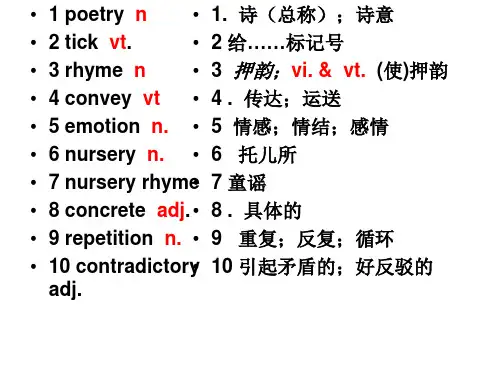
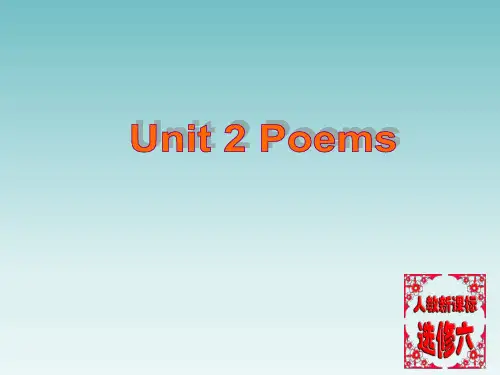

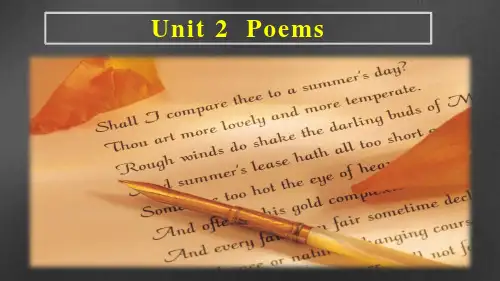
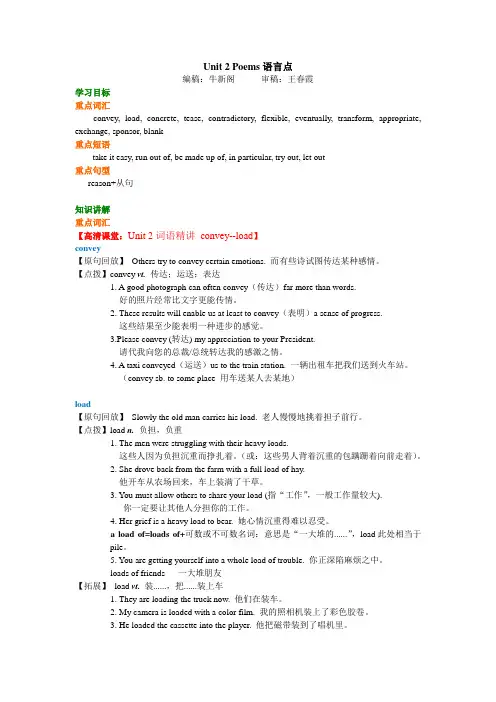
Unit 2 Poems语言点编稿:牛新阁审稿:王春霞学习目标重点词汇convey, load, concrete, tease, contradictory, flexible, eventually, transform, appropriate, exchange, sponsor, blank重点短语take it easy, run out of, be made up of, in particular, try out, let out重点句型reason+从句知识讲解重点词汇【高清课堂:Unit 2词语精讲convey--load】convey【原句回放】Others try to convey certain emotions. 而有些诗试图传达某种感情。
【点拨】convey vt.传达;运送;表达1. A good photograph can often convey(传达)far more than words.好的照片经常比文字更能传情。
2. These results will enable us at least to convey(表明)a sense of progress.这些结果至少能表明一种进步的感觉。
3.Please convey (转达) my appreciation to your President.请代我向您的总裁/总统转达我的感激之情。
4. A taxi conveyed(运送)us to the train station. 一辆出租车把我们送到火车站。
(convey sb. to some place 用车送某人去某地)load【原句回放】Slowly the old man carries his load. 老人慢慢地挑着担子前行。
【点拨】load n. 负担,负重1. The men were struggling with their heavy loads.这些人因为负担沉重而挣扎着。

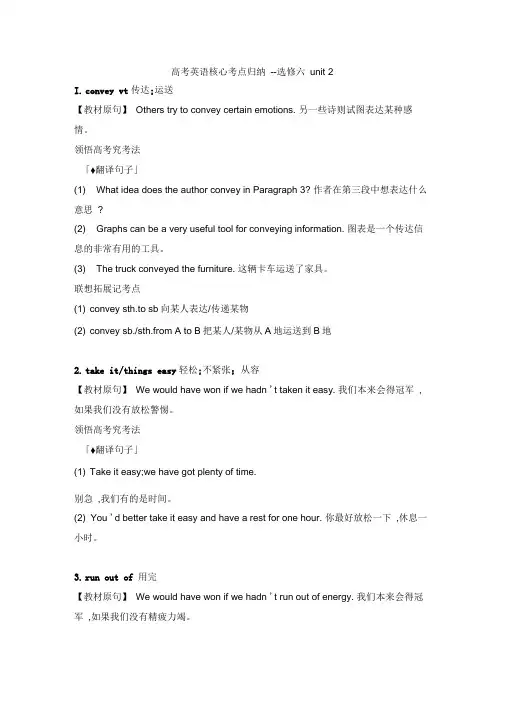
高考英语核心考点归纳--选修六unit 2I.convey vt传达;运送【教材原句】Others try to convey certain emotions. 另一些诗则试图表达某种感情。
领悟高考究考法「♦翻译句子」(1) What idea does the author convey in Paragraph 3? 作者在第三段中想表达什么意思?(2) Graphs can be a very useful tool for conveying information. 图表是一个传达信息的非常有用的工具。
(3) The truck conveyed the furniture. 这辆卡车运送了家具。
联想拓展记考点(1) convey sth.to sb向某人表达/传递某物(2) convey sb./sth.from A to B把某人/某物从A地运送到B地2.take it/things easy轻松;不紧张;从容【教材原句】We would have won if we hadn 't taken it easy. 我们本来会得冠军,如果我们没有放松警惕。
领悟高考究考法「♦翻译句子」(1) Take it easy;we have got plenty of time.别急,我们有的是时间。
(2) You 'd better take it easy and have a rest for one hour. 你最好放松一下,休息一小时。
3.run out of 用完【教材原句】We would have won if we hadn 't run out of energy. 我们本来会得冠军,如果我们没有精疲力竭。
「♦翻译句子」(1) Paragraph 1 mainly tells us that artificial intelligenee may run out of human con trol.本文第一段主要陈述了人工智能有可能会脱离人类的控制。
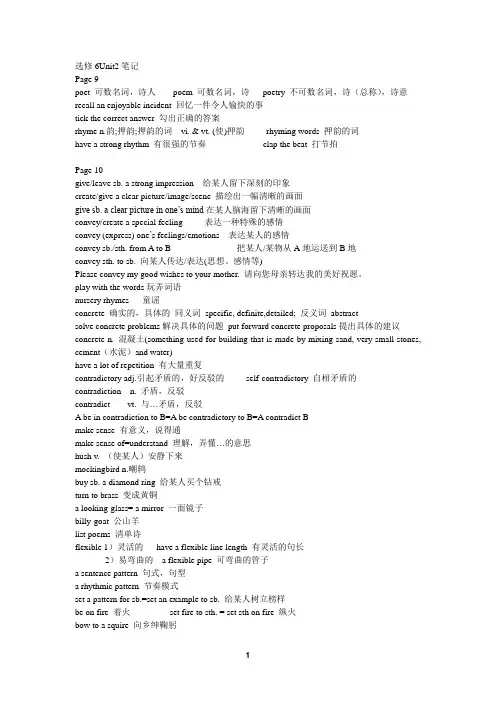
选修6Unit2笔记Page 9poet 可数名词,诗人poem 可数名词,诗poetry 不可数名词,诗(总称),诗意recall an enjoyable incident 回忆一件令人愉快的事tick the correct answer 勾出正确的答案rhyme n.韵;押韵;押韵的词vi. & vt. (使)押韵rhyming words 押韵的词have a strong rhythm 有很强的节奏clap the beat 打节拍Page 10give/leave sb. a strong impression 给某人留下深刻的印象create/give a clear picture/image/scene 描绘出一幅清晰的画面give sb. a clear picture in one’s mind在某人脑海留下清晰的画面convey/create a special feeling 表达一种特殊的感情convey (express) one’s feelings/emotions 表达某人的感情convey sb./sth. from A to B 把某人/某物从A地运送到B地convey sth. to sb. 向某人传达/表达(思想、感情等)Please convey my good wishes to your mother. 请向您母亲转达我的美好祝愿。
play with the words玩弄词语nursery rhymes 童谣concrete 确实的,具体的同义词specific, definite,detailed; 反义词abstractsolve concrete problems解决具体的问题put forward concrete proposals提出具体的建议concrete n. 混凝土(something used for building that is made by mixing sand, very small stones, cement(水泥)and water)have a lot of repetition 有大量重复contradictory adj.引起矛盾的,好反驳的self-contradictory 自相矛盾的contradiction n. 矛盾,反驳contradict vt. 与…矛盾,反驳A be in contradiction to B=A be contradictory to B=A contradict Bmake sense 有意义,说得通make sense of=understand 理解,弄懂…的意思hush v. (使某人)安静下来mockingbird n.嘲鸫buy sb. a diamond ring 给某人买个钻戒turn to brass 变成黄铜a looking-glass= a mirror 一面镜子billy-goat 公山羊list poems 清单诗flexible 1)灵活的have a flexible line length 有灵活的句长2)易弯曲的 a flexible pipe 可弯曲的管子a sentence pattern 句式,句型a rhythmic pattern 节奏模式set a pattern for sb.=set an example to sb. 给某人树立榜样be on fire 着火set fire to sth. = set sth on fire 纵火bow to a squire 向乡绅鞠躬cottage 村舍,小屋be made of lead 由铅做成coffin 棺材sparrow 麻雀make lace 做花边score a goal 进球score 二十scores of fans 许多球迷two score fans 四十个球迷two score of the fans这些球迷中的四十人stay up/sit up 熬夜day by day=day after day 日复一日be brimful of=be full of 充满了…melt(melted, melted/molten) vi. 融化;溶化;软化take one’s eyes off sth. 把目光从…上移开take it easy/take things easy放轻松,别紧张=relax = Don’t be nervous/Don’t worry take one’s time别着急,慢慢来=Don’t hurrySb. run out of sth. 某人用完某物=Sb. use up sthSth run out (时间、燃料、水、食物、钱、体力、耐心等)被用完=Sth be used up Sth give out.(燃料、水、食物、钱,体力,耐心)耗尽,被用完,没有了give out vt.发出(声、味、信号等),宣布;give out sth. to sb. 散发,分发cinquain poem 五行诗tease=make fun of=play tricks on 取笑某人,捉弄某人tease a kitten 戏弄小猫Don’t get upset; I was only teasing/kidding/joking. 不要生气,我只是开玩笑的。
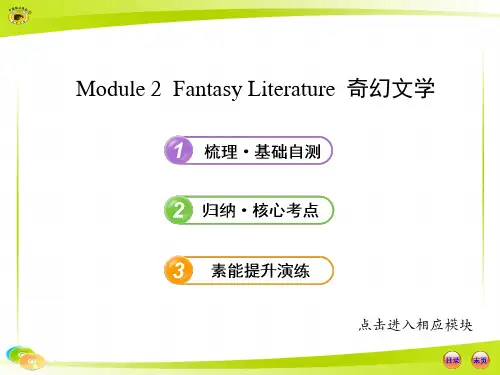
选修6unit2知识点选修6 Unit 2 知识点本文将围绕选修6 Unit 2的知识点展开介绍。
该单元主要涉及传媒领域的内容,包括媒体与社交网络、网上购物、健康与生活方式等。
下面将分为以下几个部分进行论述。
一、媒体与社交网络现代社会中,媒体与社交网络已经成为人们获取信息、交流思想的重要途径。
在这一部分中,我们将讨论各种媒体形式的特点、利与弊、以及如何正确使用社交网络等内容。
首先,我们来看传统媒体的特点。
报纸、电视和广播等传统媒体,以其广泛的覆盖面和定时更新的特点,能够向大众提供全面、即时的信息。
然而,这些传统媒体的缺点也逐渐显现出来,比如无法实时更新、信息选择性不够等。
与传统媒体相比,新媒体如社交网络则具有即时性强、互动性好等特点,深受年轻人的喜爱。
然而,社交网络的使用也存在着信息真实性难以保证、个人信息隐私泄露等问题。
接下来,我们将探讨如何正确使用社交网络。
首先,我们应该保护自己的个人信息,避免隐私泄露。
其次,我们要有意识地筛选和分辨信息真实性,不信谣、不传谣。
此外,我们还应该注意网络礼仪,避免在社交网络上发表不当言论。
总之,正确使用社交网络有助于我们更好地利用网络资源、拓宽信息渠道。
二、网上购物随着互联网的不断发展,网上购物逐渐成为人们生活中的一种普遍行为。
在这一部分中,我们将讨论网上购物的优势、风险以及如何安全地进行网上购物等内容。
首先,我们来看网上购物的优势。
网上购物无需人们出门,不受时间限制,提供了丰富的商品选择,并且通常价格也较为便宜。
然而,网上购物也存在一些风险,比如不合理的售后服务、无法亲自试穿试用等等。
因此,在进行网上购物时,我们需要选择有信誉的电商平台,了解售后服务政策,并注意商品的评价和口碑。
为了安全地进行网上购物,我们还应该注意以下几点。
首先,确保网上支付的安全性,选择正规的支付平台,并避免在公共网络进行支付操作。
其次,核实商品信息和商家的资质,避免购买假冒伪劣产品。
此外,建议保留相关订单和支付凭证,便于发生纠纷时维权。
选修6unit2知识点在选修 6 的 Unit 2 中,我们接触到了一系列丰富而有趣的知识点。
首先,诗歌的各种形式和特点是这一单元的重点之一。
诗歌有着独特的韵律和节奏。
韵律是指在诗行中重复出现的声音模式,比如押韵。
押韵又分为多种类型,像尾韵,就是诗句末尾的音节发音相似;还有头韵,是单词开头的辅音重复。
节奏则是通过音节的长短和重音的安排来实现,这让诗歌读起来富有音乐性。
在诗歌的表现手法方面,比喻和象征是常见且重要的。
比喻能让抽象的概念变得具体生动,比如“她的笑容像阳光一样灿烂”,用“阳光”来比喻笑容,让人一下子就能感受到那种温暖和明亮。
象征则是以具体的事物代表某种抽象的概念或情感,像玫瑰常常象征爱情。
意象也是诗歌中不可或缺的元素。
诗人通过选择特定的意象来营造氛围、传达情感。
比如,月亮可能象征着思念或孤独,大海可能代表着广阔和未知。
这一单元还涉及到不同主题的诗歌。
有的诗歌描绘自然之美,通过对山川、河流、花草树木的描写,表达诗人对大自然的热爱和敬畏。
有的诗歌关注人生哲理,探讨生命的意义、时间的流逝、人性的善恶等深刻的话题。
还有的诗歌抒发个人情感,如爱情的甜蜜与痛苦、友情的珍贵、思乡的愁绪等。
在语法方面,本单元重点学习了虚拟语气。
虚拟语气用于表示假设、愿望、建议等与事实相反或不太可能发生的情况。
比如,“If I were you, I would do it differently”(如果我是你,我会做得不一样。
)这里用“were”而不是“was”,就是虚拟语气的一种常见用法。
对于词汇,我们学习了一系列与诗歌、情感、想象等相关的单词。
比如“rhythm”(节奏)、“rhyme”(韵律)、“imagery”(意象)、“emotion”(情感)、“fantasy”(幻想)等等。
在学习这一单元的过程中,我们还进行了诗歌的创作和朗诵。
通过自己动手写诗,更深刻地体会到诗歌的魅力和创作的乐趣。
朗诵诗歌则帮助我们更好地把握诗歌的节奏和情感。
英语选修六二单元知识点总结想要提高语言类学科的成绩,就必须培养同学们对本门语言的兴趣,高中英语是一门必修课,尤为重要,接下来店铺为你整理了英语选修六二单元知识点总结,一起来看看吧。
英语选修六二单元知识点短语总结1. go over 复习,检查2. make sense 有意义,说得通(Sb.) make sense of sth 理解……(Sth.) make sense to sb. 有意义,说得通3. recite / read / explainsth. to sb. 给某人背诵/读 / 解释……4. couvey one`s emotions 表达情感5. bow to … 向鞠躬 / 屈服6. stay/sit up 熬夜7. take it easy = takethings easy 放轻松,别紧张take one`s time 别着急,慢慢来8. (Sb.) run out ofsth. 用完,耗尽(及物)(Sth.) run out 用完(不及物)9. make up 组成 / 编造 / 化妆 / 弥补 / 和解be made up of = consist of …由……组成10. a few more minutes 再多几分钟11. be popular with … = bewell received by … 很受欢迎12. be brimful of = be fullof … 充满13. translate A into B 把A翻译成B14. week in ,week out 一周又一周day by day 一天又一天15. on and on 继续不停地16. by chance / accident 碰巧17. hold on 继续 / 别挂断(电话)18. (Sb. / Sth.) be likelyto do sth.有可能…..19. try out 试验try on 试穿20. let out 泄漏 / 发出(声音) / 释放 / 放宽(衣服)21. look forward to 盼望英语选修六二单元知识点句子总结1. There are various reasonswhy people write poetry. Some poems tell a story or describe something in a waythat will give the reader a strong impression. Others try to convey certainemotions.人们写诗有各种各样的原因。
有些诗是为了叙事,或描叙某事给读者以强烈的印象。
而有些是为了传达某种感情。
2. They delight smallchildren because they have strong rhyme and rhythm and have a lot ofrepetition.这些童谣能使孩子们快乐,因为它们节奏感强,又押韵,而且重复多遍。
3. We would have won if Jackhad scored that goal.(对过去的虚拟)如果杰克踢进了那个球的话,我们就赢了。
4.It is not atraditional form of English poetry but it is very popular with Englishspeakers.它不是英诗的传统形式,但在说英语的人们中间,这种诗是很流行的。
英语选修六二单元知识点语法总结1. 虚拟语气在if条件状语从句中的用法:条件句从句中谓语的形式主句谓语的形式表示现在情况动词过去式(be的过去式用were)should / would / might / could +动词原形表示将来情况should +动词原形;should / would / might / cwere to +动词原形;动词过去式(be的过去式用were)ould +动词原形表示过去情况had +过去分词should / would / might / could + have +过去分词如:If John had time, he would attend the meeting.If it were to / should rain / rained tomorrow, the meeting would be put off.If you had come yesterday, you would have met Jim.2. 虚拟语气在as if / though引导的方式状语从句中的用法:在as if / though引导的方式状语从句中,谓语动词常用虚拟语气,其形式与wish后宾语从句的谓语动词用法相似。
如:You treat the elderly as if / though they were your parents.He behaved as if / though nothing had happened.3. 虚拟语气在宾语从句中的用法:①wish后宾语从句中的用法:宾语从句wish后宾语从句中谓语的常见形式表示现在情况动词过去式(be的过去式用were)表示将来情况would / could / might +动词原形表示过去情况had +过去分词如:I wish I were a bird!I wish I could be with you for the next three months.We wish we had done better in our work.②虚拟语气在would rather后宾语从句中的用法:宾语从句would rather后宾语从句中谓语的常见形式表示现在或将来情况动词过去式(be的过去式用were)表示过去情况had +过去分词如:He’d rather his children did not make so much noise.I’d rather you came again the day after tomorrow.I’d rather you had not done that.③虚拟语气在某些动词后的宾语从句中的用法:在表示坚持、愿望、建议、命令、请求等动词后的宾语从句中,谓语动词常用“(should +)动词原形”。
为了便于记忆可归纳为:一个“坚持(insist)”,两个“命令(order, command)”,三个“建议(advise, suggest, propose)”,四个“要求(demand, desire, request, require)”。
如:Lucy insisted that she (should) go abroad.The doctor suggested that I (should) stay in bed for another week.注意:当insist表示“坚持认为,坚持说”时,后接的从句不用虚拟语气;当suggest表示“暗示,表明”时,后接的从句也不用虚拟语气。
如:We insisted that we had never learned this word before.His silence suggests that he agrees with me.4. 虚拟语气在含蓄条件句中的用法:虚拟的条件有时可以不用条件从句来表示,而是暗含在某些词、短语或上下文中。
常见的词或短语有without, or, otherwise, but for 等。
如:Without the message, I would not have found the lost computer.I went over all my notes; otherwise I couldn’t have done so well in the exam.But for your help, we couldn’t have finished the work ahead of time.5. 虚拟语气在错综时间条件句中的用法:有时候,条件状语从句的谓语和主句的谓语所表示的动作在时间上并不一致,这类句子称为错综时间条件句。
此时,主句和从句的谓语动词要根据各自所指的不同时间选用适当的虚拟语气形式。
如:If you had taken my advice, you wouldn’t be in such trouble now.If he had been trying hard, his parents wouldn’t be so worried.6. 虚拟语气的其它用法:①在“It is +(表愿望、建议、命令、要求、惊讶、怀疑、不满、必要性、重要性等意义的)形容词/过去分词/名词 + 从句”结构中,从句的谓语动词常用“(should +)动词原形”。
如:It is strange that he (should) have so many friends.It’s necessary that the problem (should) be settled immediately.It is recommended by the doctor that I (should) give up smoking.It’s a shame that she (should) behave like that.②在表示请求、建议、要求、愿望、命令等意义的名词(如request, suggestion, proposal, desire, order等)后面的同位语从句中,谓语动词常用“(should +)动词原形”。
如:My suggestion is that we (should) send a few students to help the other groups.The captain has given orders that it (should) be done.③在It is (high / about) time后的定语从句中,谓语动词用虚拟语气,多用过去式,意为“该干……了”。
如:It is high time that we took measures to protect these endangered animals.It is time that you made up your mind.④在if only(但愿,要是……就好了)引导的非真实条件句中,谓语动词常用虚拟语气,其谓语动词形式与wish后宾语从句的谓语动词用法相同。